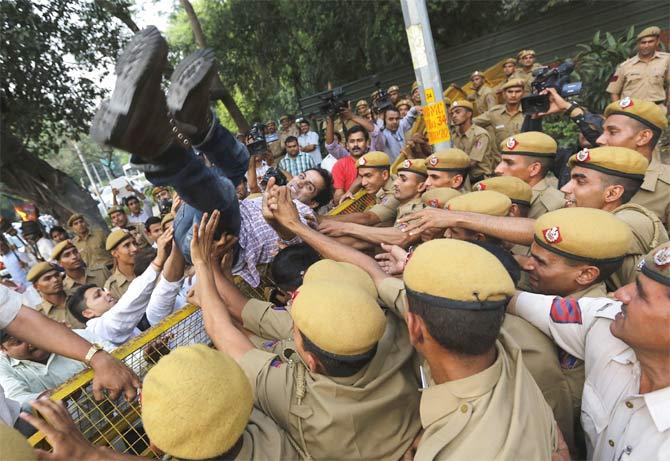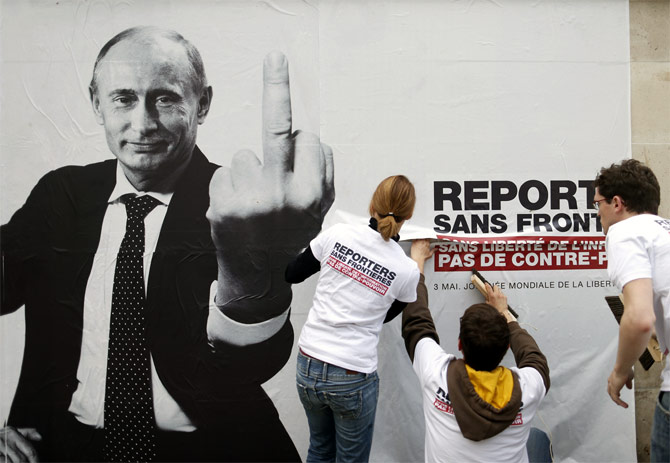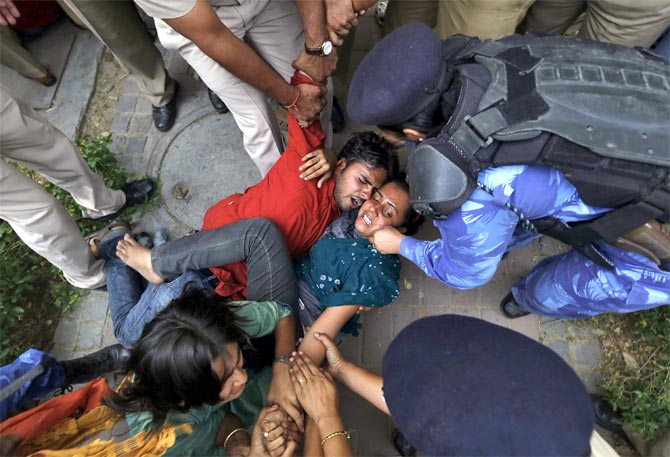Photographs: Adnan Abidi/Reuters
The thing that looks terribly outdated, though, is the balance of power between those who govern and those whom they govern, says Mitali Saran
Just look around this joint -- it's enough to make you wonder if you are asleep and having a nightmare.
Women are harassed, oppressed, bullied, raped and murdered, brutally and constantly. Our record-keeping systems are so lousy that the December 16 gang rape in Delhi, which turned the stomach of the whole world, does not even feature as a rape.
The police pick up students protesting the lack of hostel accommodation for out-of-towners, in the dead of night.
Officials give land away to pseudo-spiritual leaders for next to nothing.
Indian athletes can only attend the Olympics as individuals, not as representatives of their country, because our Olympic body is accused of corruption.
Millions of people still can't get three square meals or a decent doctor but we're planning ahead to when they divvy up Mars.
Politicians from across the political spectrum are seen to be inciting, or at least not making an effort to prevent, rioting. The man who says that the Samajwadi Party has lost the moral authority to rule in Uttar Pradesh is, simultaneously, running around the country begging people to give the top job to Narendra Modi.
There is enough irony there to sink a ship. Oh wait, we already did something like that in Mumbai harbour.
Click on NEXT for more…
Rest of the world also seems to have slipped
Image: Activists from Reporters Without Borders paste a poster depicting Russia's President Vladimir Putin to mark the 20th annual World Press Freedom dayPhotographs: Benoit Tessier/Reuters
India can sometimes look a lot like a bad trip.
The rest of the world also seems to have slipped several degrees from what seems normal.
Vladimir Putin, he of the weird shirtless, bear-fighting, motorcycle-riding, hopped-up machismo, is talking to America through the pages of The New York Times and sounding responsible; while Barack Obama, he of the hopey-changey supercool intellect bent on consensus, is threatening to charge into Syria (albeit later) as if two disastrous wars haven't sated his appetite for wallet-destroying, blood-spilling, reputation-pulverising brawls.
America, champion of democratic rights and free speech, is the most tightly controlled, spied-on country in the free world. The president of Brazil, not the president of the United States, is the man who can get Iran to talk and accept compromise.
It's the French, not so long ago sneeringly known as "surrender monkeys", who are managing to achieve efficient, decisive military strikes. I'm not saying that any of that is such a bad trip.
Click on NEXT for more…
Something unimaginable has happened
Image: A girl playing with her doll looks on outside her house at a slum in New DelhiPhotographs: Anindito Mukherjeei/Reuters
The thing that looks terribly outdated, though, is the balance of power between those who govern and those whom they govern. Power has been accepted as one-sided for so long in the history of the world that, even in democracies, we simply accept that we are helpless sheep in the grip of leaders we disapprove of (at least until election day comes around).
But something unimaginable and unparalleled in human history has happened: the internet. Suddenly billions of perfectly ordinary people can get in touch with each other from across the planet, exchange and check information, publish whatever the hell they want, express themselves and stand a chance of having an audience too. They can suddenly find, at the press of a button, millions and millions of people who share their views.
This means that it has become breathtakingly more possible for regular people to organise. In the same way that the private sector in India finds ways to bypass the gorgon that is the public sector, cyber citizens are empowered by virtue of being able to bypass the gorgon that is real world administration.
Click on NEXT for more…
Someone or the other will abuse pretty much anything
Image: Policemen push protesters during a demonstration against the rising cases of rape in DelhiPhotographs: Adnan Abidi/Reuters
Tiny agile individuals co-ordinated into a single organism can negotiate large monoliths, like an army of ants swarming past an elephant blocking their path. Depending on how many people you can organise into a particular activity, you can do anything from find a nanny at short notice, to set up a neighbourhood watch, to take out a protest rally, to get tens of thousands of signatures on a petition, to raise funds for a multi-million dollar pet project, to overthrow a government.
Nothing unnerves the powerful as much as noticing that the scales are tipping the other way. (Cue shadowy people reading our email and listening to our phone calls to creepy music.) Can you imagine what would happen if thousands of, say, Delhi's citizens decided to concertedly sue the Delhi authorities for leaving dangerous rubble on roads or failing to clean drains or not registering FIRs?
The best answer that power can come up with is that connectivity is easily abused. (The fact that it is regularly abused by power itself does not get in the way of this argument.)
But someone or the other will abuse pretty much anything, from alcohol to children, and nobody is telling you that you can't have any of either.
Regular people are sitting on the biggest political weapon of all. We're only just starting to realise that that is not just a pleasant dream.
Click on NEXT for more…
TOP photo features you missed last week
...






article